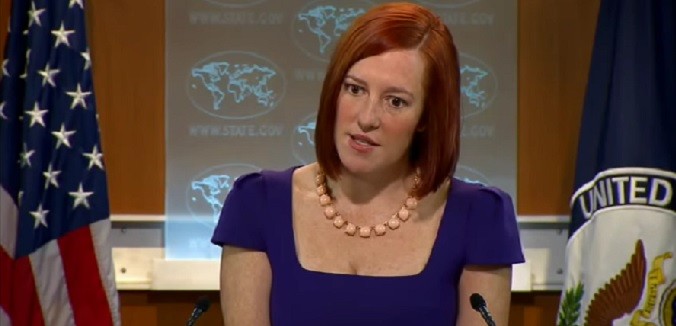The State Department was pressed on Tuesday over mounting evidence that Iranian crude export violations – in which the Iranians have for the last six months exceeded the cap of 1 million barrels per day (bpd) set by the interim Joint Plan of Action (JPA) – will not be balanced out by the end of the JPA’s six-month negotiation period, and will instead have provided the Iranians with significant sanctions relief in excess of what administration officials publicly disclosed.
Veteran Associated Press diplomatic correspondent Matthew Lee asked State Department Spokesperson Jen Psaki about the status of previous assurances, in which Psaki had brushed off concerns regarding Iranian violations by declaring that future drops in exports would make everything balance out over six months:
QUESTION: Yes. A couple weeks ago, or a week or so ago, you were asked by Arshad a question, a very detailed question about oil sales, Iranian oil sales. And at the time you said that you were confident that the average – the six-month average up till July was going to be okay under the million (inaudible). There are new statistics out now which show that that will be mathematically impossible, that keeping that average where you said it was – I mean, it can’t be done now because there’s been such a surge in their exports. Do you have any concerns about this?
MS. PSAKI: Well, not that I don’t take your mathematical word for it, but let me talk to our team and see what their view is. And I mentioned at the time when he asked, which I think was a couple of weeks ago, about some of the other factors that we take into account. So why don’t I take it and get a more fulsome – a better answer for all of you.
The exchange came a few days after Timothy Wilson, a visiting fellow at the Foundation for Defense of Democracies (FDD), published numbers based on Iranian statements and tanker capacities that suggested that four months in, Tehran had already exceeded a capacity greater than the six-month average from last year:
Iran’s crude oil supertankers are likely exporting more oil than planned and agreed upon under the Joint Plan of Action (JPOA). The U.S. Department of State stated in its overview of the JPOA that while the P5+1 negotiate with Iran over its illicit nuclear program, the goal was to maintain oil exports at “current average levels during the JPOA period.” The average for 2013 Iranian tanker movements was 190.2 million barrels capacity for a six month period, or 31.7 million barrels per month. Iran has apparently exceeded this six month total already.
In the period from January 20 to February 20, 2014, sailings totaled 47.249 million barrels capacity, rising to 60.142 million barrels in the next month before falling slightly to 41.761 million barrels the month after. But in the period April 20 to May 20, 2014, sailings rose again to 49.772 million barrels capacity. Thus, only four months into the six month JPOA period, sailings so far have totaled 198.9 million barrels capacity at an average of 49.725 million barrels per month – already a greater amount than the average of a full six month period in 2013.
At stake are deepening worries that Iranian sanctions-busting will erode Western leverage as negotiators try to wrap up a deal with Iran before a self-imposed July deadline. FDD Executive Director Mark Dubowitz worried last week that eroding leverage may prevent American diplomats from securing “[a]n agreement that is verifiable, enforceable and that prevents Iran from pursuing both a uranium and a plutonium pathway to a nuclear weapon would be a tremendous achievement.”
Iranian media bragged on Monday that domestic companies participating in a trade exhibition had “signed six contracts for technology transfer and 9 memoranda of understanding (MoUs) on exchange of technical knowhow with the foreign companies.”
[Photo: U.S. Department of State / YouTube]




